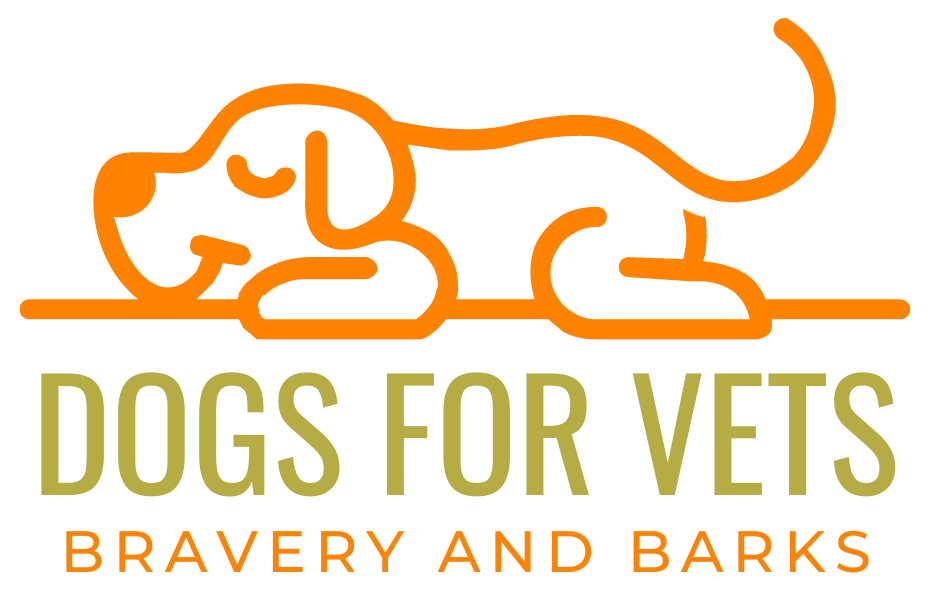This post may contain ads and affiliate links and we may earn a small commission when you click on the links at no additional cost to you. As an Amazon Affiliate, we earn from qualifying purchases. You can read our full disclaimer here.
Older Goldendoodle Care: Tips for a Happy Senior Companion
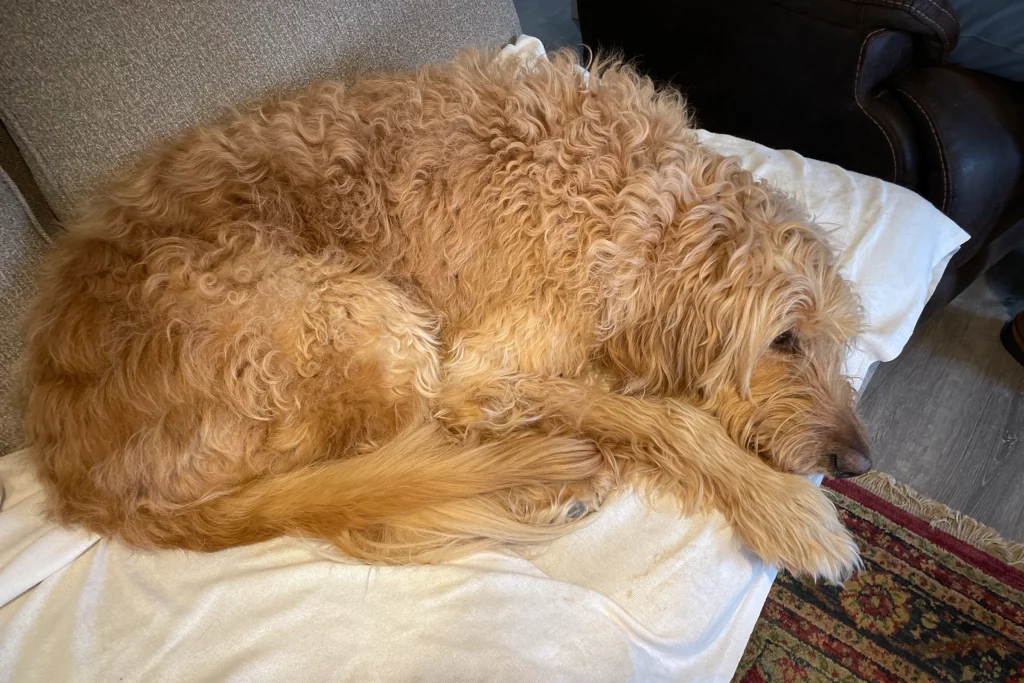
Caring for an older Goldendoodle brings its own set of joys and challenges.
As your furry companion enters their golden years, you may notice changes in their energy levels, health, and even their loving nature.
It’s important to understand how aging can affect your Goldendoodle so that you can provide the best care for a comfortable and happy life.
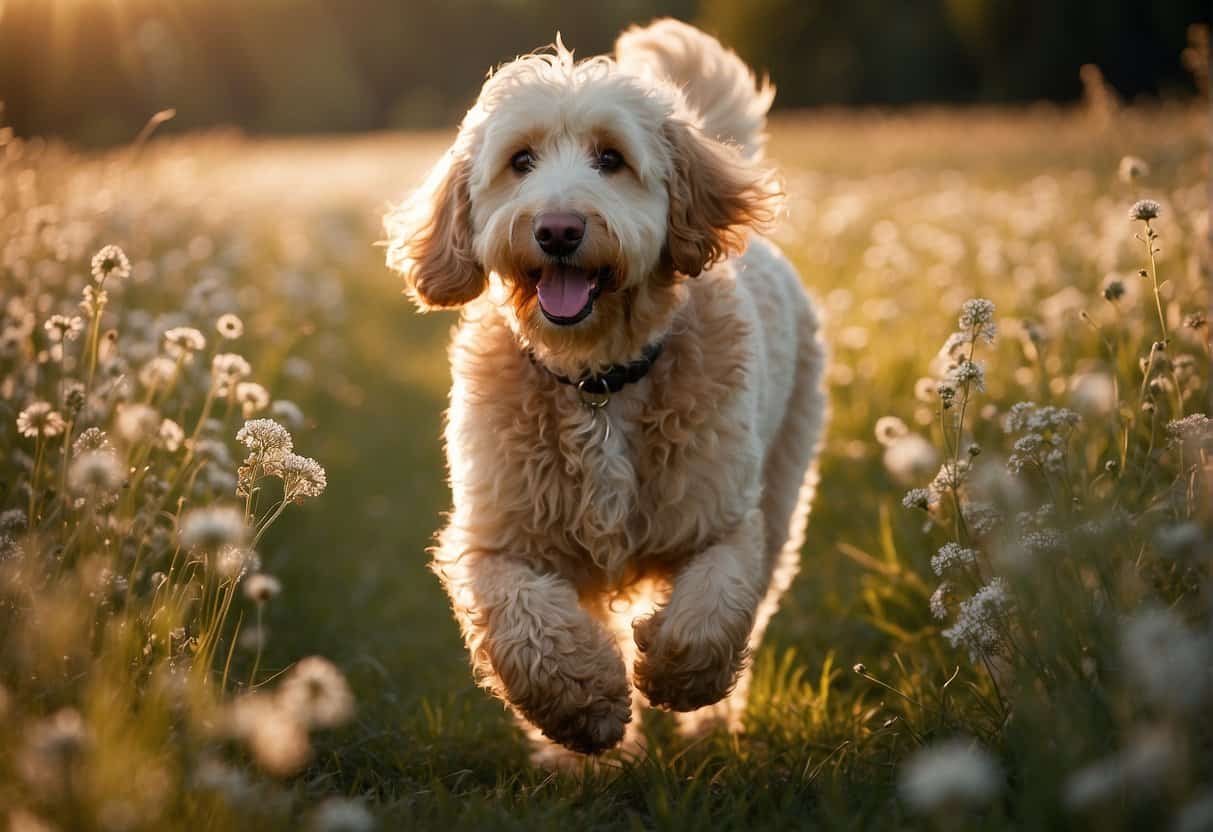
Your Goldendoodle’s once boundless energy may begin to wane, but their desire for warmth and affection remains strong. They may seek your company more often, looking for comfort and reassurance.
Adjustments to their diet and exercise routine can help maintain their health and cater to their evolving needs.
Monitor your pet’s health with regular veterinary check-ups to catch any potential issues early. Senior Goldendoodles can develop age-related conditions, but with your loving attention and proactive care, they can still enjoy quality time with you.
Embrace these moments, and cherish the loving bond that you continue to share with your loyal Goldendoodle.
Understanding an Older Goldendoodle
Before we jump into details, it’s essential for you to know that Goldendoodles are a popular hybrid breed, resulting from a cross between Golden Retrievers and Poodles.
Their unique blend offers a mix of characteristics that appeal to many dog lovers.
Breed Origins
Goldendoodles are a relatively new breed. Your Goldendoodle’s ancestry includes Golden Retrievers, known for their friendly nature, and Poodles, recognized for their intelligence and hypoallergenic coats.
This crossbreed originated in the late 20th century, aimed at creating a larger doodle with the Golden Retriever’s qualities and Poodle’s low-shedding hair.
Physical Characteristics
Goldendoodles come in various sizes: miniature, small standard, and large standard. Coat colors range widely, with your dog possibly showcasing shades like cream, golden, red, or even multi-colors.
They have hair that is typically wavy or curly, a desirable trait inherited from their Poodle lineage, which may reduce allergic reactions.
- Size: Ranges from 15 to 24 inches tall at the shoulder
- Weight: Can vary between 30 to 45 pounds (miniature) and up to 90 pounds (large standard)
Temperament and Personality
Your Goldendoodle’s temperament is likely to be a blend of the smart, trainable nature of Poodles and the affectionate, friendly demeanor of Golden Retrievers. They are adaptable and should fit well into various household settings, thriving on human companionship.
While not known for excessive barking, they will alert you with a cute bark when necessary.
- Trainable: Yes, responds well to positive reinforcement
- Social: Enjoys the company of people and other dogs
Health and Lifespan
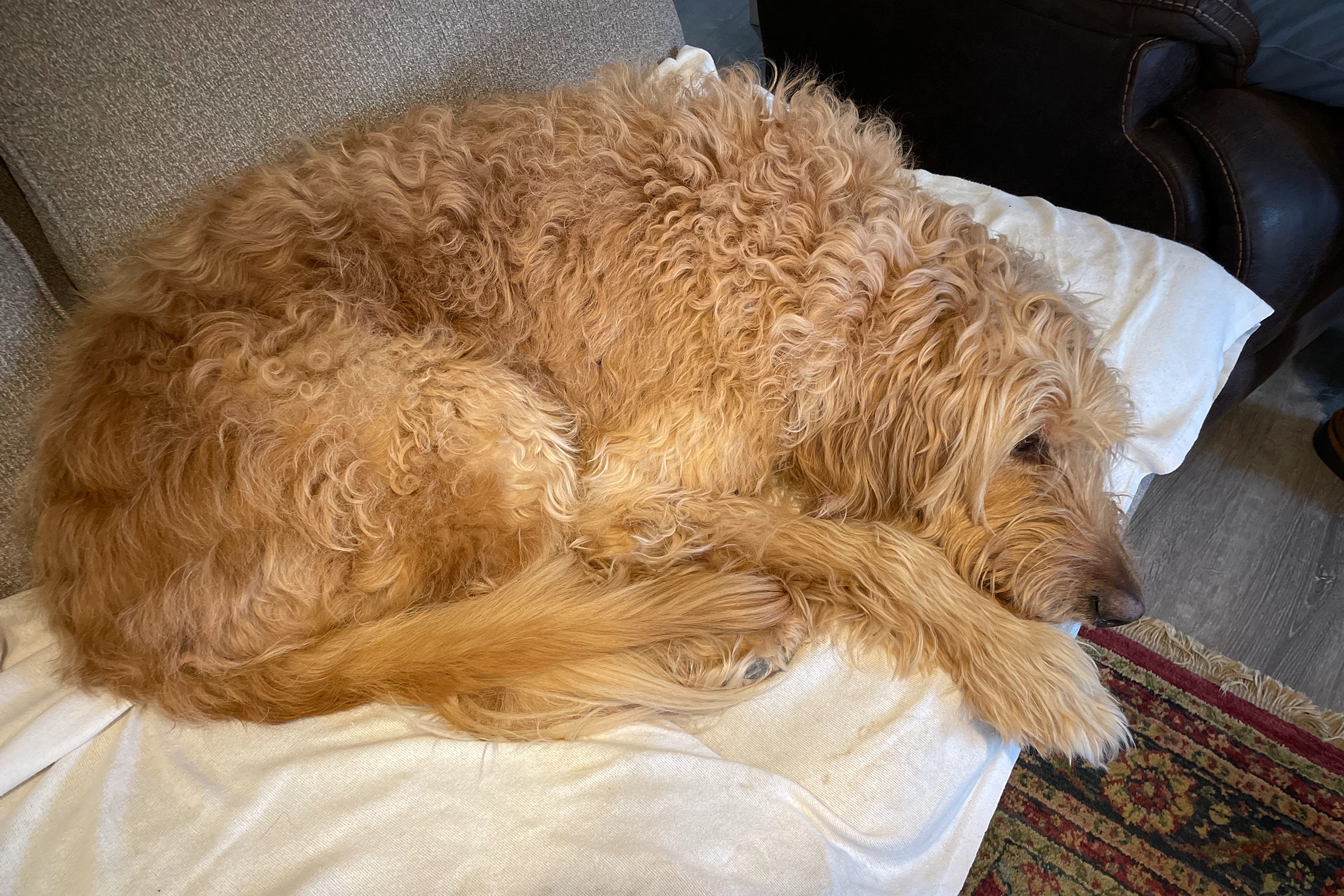
All dogs, including Goldendoodles, require proper care and regular check-ups with a veterinarian to maintain good health.
With a lifespan ranging from 10 to 15 years, they are generally healthy, but like their parent breeds, they may be prone to certain inherited conditions such as hip dysplasia, which can cause lameness.
- Common Health Issues: Hip dysplasia, ear infections, allergies
- Preventive Care: Regular veterinary check-ups, healthy diet, exercise
Your Goldendoodle requires consistent love and attention to reach its golden years with vitality and joy. With proper care, you can enjoy the companionship of your smart and loyal friend through many life stages.
Adopting Older Goldendoodles
When considering adopting an older Goldendoodle, it’s important to understand the benefits, know where to look, be familiar with the adoption process, and know how to prepare for your new friend’s arrival.
Why Adopt an Older Goldendoodle
Older Goldendoodles often come already crate-trained and are likely to be spayed/neutered, simplifying the initial care you’ll need to provide. By choosing to adopt an older dog, you’re offering a loving home to a pet that may otherwise be overlooked.
These mature canines can provide unconditional love and often settle into their new home with ease, having passed the demanding puppy stage.
Where to Find Older Goldendoodles
You can find older Goldendoodles ready for adoption through specialized organizations such as Doodle Rescue Collective or IDog Rescue. Delaware Valley Golden Retriever Rescue and Carolina Poodle Rescue also offer opportunities to adopt retired or rescued dogs.
Remember to do your research on Goldendoodle rescues – sites like Love My Doodles often have sections dedicated to older dogs looking to be rehomed.
Adoption Process
The process usually involves an application to assess your suitability, a meet-and-greet with the dog, and often a home visit.
Be prepared for questions about your lifestyle and home environment to ensure you’re a match for your prospective pet.
Here’s a quick outline of the typical steps:
- Complete an application.
- Meet the Goldendoodle.
- Home evaluation.
- Finalize adoption details.
Preparing for Your New Companion
Before your Goldendoodle arrives, ensure you have all the essentials: a bed, crate, food and water bowls, leash, and toys. Establish a local vet relationship, and consider how you’ll integrate your new companion into your routine – older dogs often thrive on consistency.
Make your home safe and welcoming for your new friend, taking care that your space accommodates an older dog’s needs.
Caring for Your Older Goldendoodle
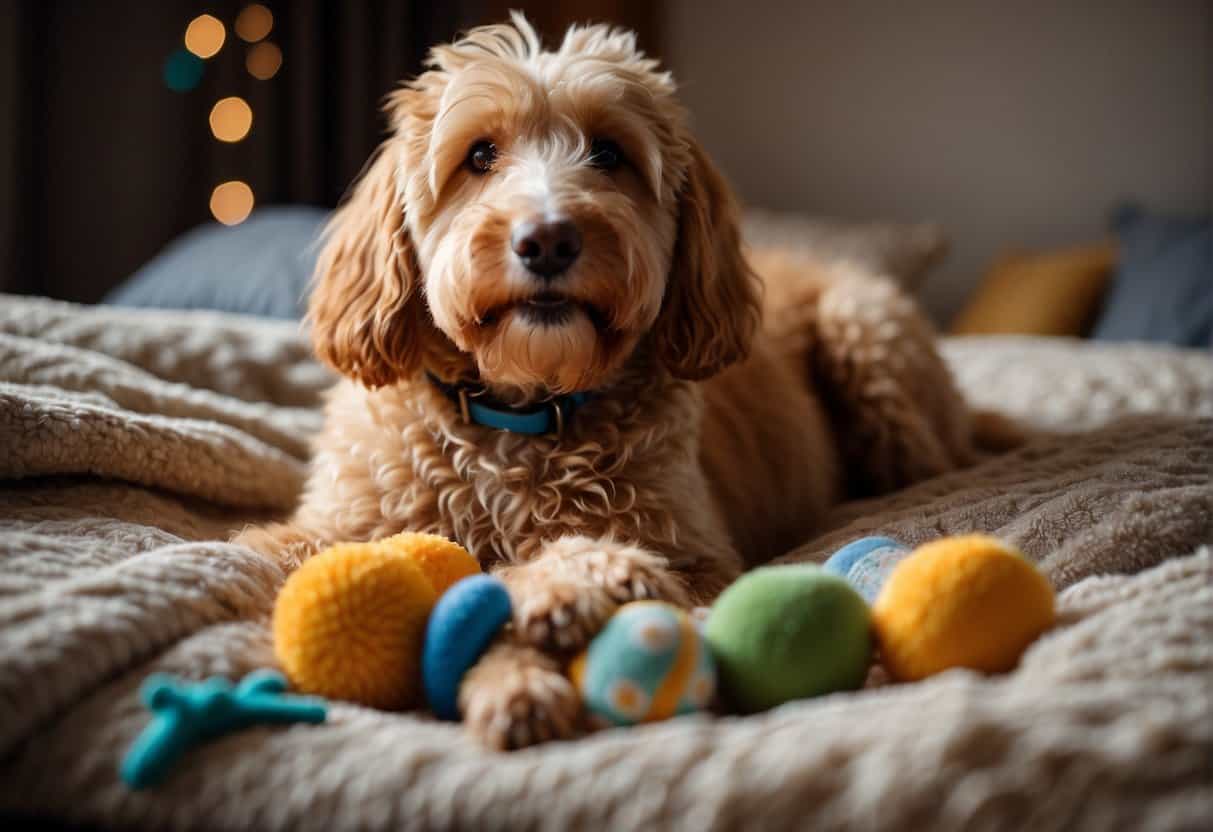
Managing the needs of your older Goldendoodle involves adapting to their changing lifestyle. Proper care ensures their comfort and well-being during their golden years.
Nutritional Needs
As your Goldendoodle ages, their metabolism slows down, requiring fewer calories. You should provide a balanced diet that’s formulated for senior dogs, which includes:
- High-quality protein: to maintain muscle mass.
- Lowered fat content: to prevent obesity.
- Essential fatty acids: for joint health and skin.
Consider incorporating glucosamine and chondroitin supplements after consulting with your veterinarian, as these can aid in joint support.
Exercise Requirements
Regular exercise remains important for your senior Goldendoodle, but the intensity and duration should be adjusted. Aim for:
- Daily walks: keep them short and gentle.
- Low-impact activities: such as leisurely swimming, which can help maintain muscle strength without stressing the joints.
Always monitor your dog’s behavior during exercise and provide plenty of rest periods.
Grooming and Hygiene
Continued grooming for your Goldendoodle will prevent matting and skin issues. Key points include:
- Regular brushing: at least a couple of times per week.
- Professional grooming: every 6-8 weeks for haircuts and thorough cleaning.
Pay extra attention to the ears, eyes, and teeth, cleaning them as needed to prevent infections.
Health Maintenance
Senior Goldendoodles need regular veterinary check-ups to stay on top of their health. Your vet can manage:
- Vaccine schedules: adjusting them as necessary for older dogs.
- Dental care: to avoid periodontal diseases.
- Chronic health issues: such as arthritis or heart disease.
Screenings for common age-related conditions should be frequent, aiding in early detection and treatment.
Training and Socializing an Older Goldendoodle
Goldendoodles are known for their intelligence and adaptability, which makes training an older dog both feasible and rewarding.
The Training Advantage of Older Dogs
Older Goldendoodles can often learn more quickly than puppies, as they have the ability to focus for longer periods. They also have a lifetime of experiences which can help them pick up on cues and commands with greater ease.
When you’re adopting an older Goldendoodle, remember that consistency is key in your training approach.
- Establish a Routine: Consistency helps with learning.
- Positive Reinforcement: Rewards and praise can encourage desired behaviors.
Socialization Tips
Socializing an older Goldendoodle involves exposing them to different environments and situations to ensure they remain comfortable around new people, pets, and experiences.
- Introduce New Situations Gradually: Avoid overwhelming your Goldendoodle.
- Regular Interactions: Regular walks and visits to dog parks can help build social skills.
Teaching Basic Commands
Start with fundamental commands like sit, come, down, and place. These commands not only enhance communication between you and your dog but also ensure their safety and the safety of others.
- Sit: Use a treat to guide your dog’s bottom to the ground.
- Come: Use a cheerful tone to encourage your dog to approach you.
- Down: Lead your dog to a laying position with a treat.
- Place: Direct your dog to a specific spot to relax or stay.
Crate Training and Leash Training
Crate and leash training are essential for your Goldendoodle’s well-being and your peace of mind.
- Crate Training:
- Safe Space: Make the crate a comfortable area for your dog, signaling it’s a place of rest.
- Gradual Introduction: Begin with short periods and gradually increase the time spent in the crate.
- Leash Training:
- Short Leash: Keeps your dog close and attentive.
- Consistent Commands: Reinforce commands like “heel” to maintain control during walks.
Note: Always use a friendly and patient tone while training. Your positive attitude will encourage your Goldendoodle and make training sessions more enjoyable for both of you.
Connecting with Goldendoodle Communities
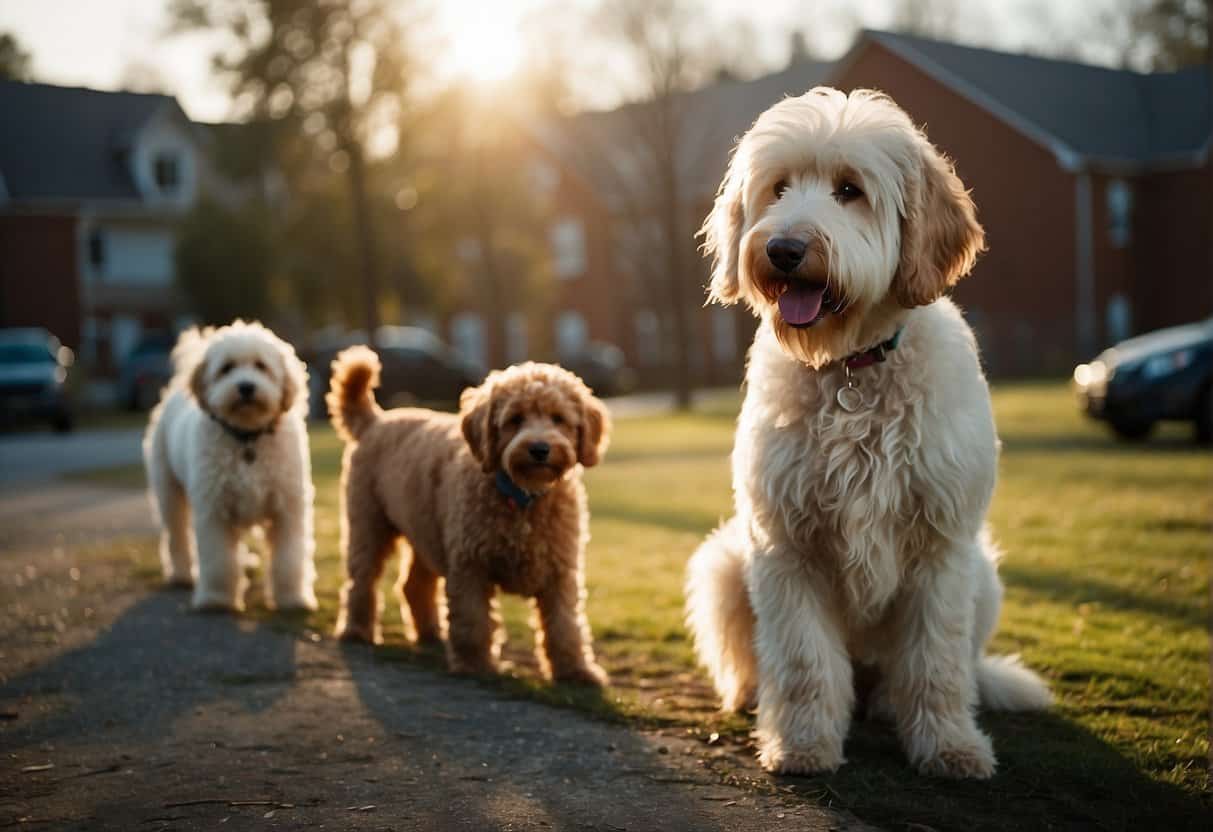
Joining Goldendoodle communities can enrich your life and provide valuable support. You’ll find camaraderie, advice, and shared experiences to help you and your best friend thrive.
Support Groups and Forums
- Goldendoodle Forums: Connect with an online network to discuss health, grooming, and training. A few examples:
- Goldendoodle Owners Group: A place to share stories and photos of your doodles.
- Doodle Health & Wellness Forum: Focused discussions on maintaining your Goldendoodle’s well-being.
- Local Support Groups: Check local listings for Goldendoodle support groups where you can directly engage with other doodle owners.
- Monthly Discussion Groups: Local libraries or pet store bulletin boards often list these gatherings.
- Online Community Boards: Websites like Meetup.com can help you locate nearby Goldendoodle enthusiasts.
Events and Meetups
- Local Doodle Meetups: Search for upcoming gatherings tailored to Goldendoodle owners and lovers.
- Weekly Walks:
- When: Every Saturday, 9 AM
- Where: Central Park, Dog-Friendly Area
- Annual Doodle Romp:
- Date: August 5th
- Location: Clearwater Beach Dog Park
- Doodle Festivals: These are larger annual events celebrating the breed with contests, parades, and vendor booths.
- Doodle Palooza: A carnival-like event full of fun activities for you and your doodle.
- Weekly Walks:
By engaging with these groups and attending events, you’ll forge a deeper bond with your beloved Goldendoodle and gain a support network that understands the love for your furry best friend.
Final Thoughts on Older Goldendoodle Care
Caring for an older Goldendoodle requires a blend of love, patience, and attention to their changing needs. As they enter their senior years, it’s essential to adapt your care routine to ensure they remain comfortable and joyful.
Regular veterinary check-ups, a balanced diet, gentle exercise, and your unwavering companionship are the keys to a fulfilling and happy life for your aging Goldendoodle.
Remember, the love and care you provide during these golden years will enrich both your lives, creating cherished memories in every shared moment.
-
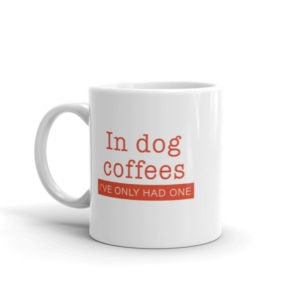
Coffee Mug – In Dog Coffees I’ve Only Had One
Price range: $11.95 through $14.95 Select options This product has multiple variants. The options may be chosen on the product page
